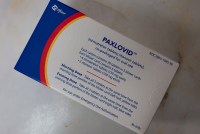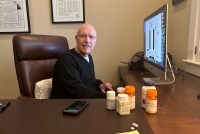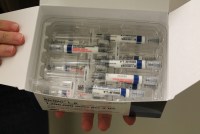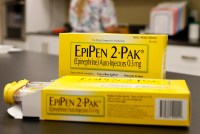Latest Morning Briefing Stories
What the Health? From KFF Health News: Maybe It’s a Health Care Election After All
Health care wasn’t expected to be a major theme for this year’s elections. But as President Joe Biden and former President Donald Trump secured their respective party nominations this week, the future of both Medicare and the Affordable Care Act appears to be up for debate. Meanwhile, the cyberattack of the UnitedHealth Group subsidiary Change Healthcare continues to do damage to the companies’ finances with no quick end in sight. Margot Sanger-Katz of The New York Times, Anna Edney of Bloomberg News, and Joanne Kenen of Johns Hopkins University and Politico Magazine join KFF Health News’ Julie Rovner to discuss these issues and more. Also this week, Rovner interviews Kelly Henning of Bloomberg Philanthropies about a new, four-part documentary series on the history of public health, “The Invisible Shield.” Plus, for “extra credit” the panelists suggest health policy stories they read this week that they think you should read, too.
Ya hay una droga oral para la depresión postparto… pero cuesta $16,000
Abogados, defensores y reguladores están observando de cerca cómo las aseguradoras diseñarán las normas para cubrirlo.
A New $16,000 Postpartum Depression Drug Is Here. How Will Insurers Handle It?
A pill form of an effective drug for postpartum depression hit the market in December, but most insurers do not yet have a policy on when or whether they will pay for it. The hurdles to obtain its predecessor medication have advocates worried.
Colorado Isn’t Giving up on Its Drug Importation Dream
Colorado hopes to join Florida to become only the second state authorized to import prescription drugs from Canada. But they’re hitting the same hurdles: drugmakers — and the FDA. Colorado officials recently amended their 2022 importation application with the Food and Drug Administration, in the process revealing new correspondence that shows the state’s so-far fruitless […]
Why Covid Patients Who Could Most Benefit From Paxlovid Still Aren’t Getting It
Price worries, bureaucratic obstacles, and “I’m-over-covid-itis” slow uptake of a drug that’s complicated to take but often effective.
What the Health? From KFF Health News: The State of the Union Is … Busy
At last, Congress is getting half of its annual spending bills across the finish line, albeit five months after the start of the fiscal year. Meanwhile, President Joe Biden delivers his annual State of the Union address, an over-the-counter birth control pill is (finally) available, and controversy erupts over new public health guidelines for covid-19 isolation. Alice Miranda Ollstein of Politico, Sarah Karlin-Smith of the Pink Sheet, and Sandhya Raman of CQ Roll Call join KFF Health News’ Julie Rovner to discuss these issues and more. Also this week, Rovner interviews Neera Tanden, the White House domestic policy adviser, about Biden’s health agenda. Plus, for “extra credit,” the panelists suggest health policy stories they read this week that they think you should read, too.
Journalists Examine Medicaid Unwinding, Farmworkers’ Mental Health, and the Big Opioid Payback
KFF Health News and California Healthline staff made the rounds on national and local media this week to discuss their stories. Here’s a collection of their appearances.
Los amigos de un joven muerto por envenenamiento por fentanilo impulsan una ley estatal para que estudiantes de secundaria puedan llevar Narcan en sus mochilas sin riesgo de ser castigados.
How a Friend’s Death Turned Colorado Teens Into Anti-Overdose Activists
High school students in Colorado are pushing for a change they say is necessary to combat fentanyl poisoning: ensuring students can’t get in trouble for carrying the overdose reversal drug naloxone wherever they go, including at school.
An Arm and a Leg: Wait, Is Insulin Cheaper Now?
Did the price of insulin go down? It’s not quite that simple. On this episode of “An Arm and a Leg,” producer Emily Pisacreta explores recent changes to the cost of the diabetes medication.
Patients See First Savings From Biden’s Drug Price Push, as Pharma Lines Up Its Lawyers
A restructuring of the Medicare drug benefit has wiped out big drug bills for people who need expensive medicines. But the legal battle over drug negotiations means uncertainty over long-term savings.
What the Health? From KFF Health News: Biden Wins Early Court Test for Medicare Drug Negotiations
A federal district court judge dismissed a lawsuit attempting to invalidate the Biden administration’s Medicare prescription-drug price negotiation program. But the suit turned on a technicality, and several more court challenges are in the pipeline. Meanwhile, health policy pops up in Super Bowl ads, as Congress approaches yet another funding deadline. Alice Miranda Ollstein of Politico, Lauren Weber of The Washington Post, and Rachel Cohrs of Stat join KFF Health News’ Julie Rovner to discuss these issues and more. Plus, for “extra credit,” the panelists suggest health policy stories they read this week they think you should read, too.
Journalists Catch Up on Top Issues Facing 2024 Voters, From Obamacare to Opioids
KFF Health News and California Healthline staff made the rounds on national and local media this week to discuss their stories. Here’s a collection of their appearances.
What the Health? From KFF Health News: The Struggle Over Who Gets the Last Word
As science skepticism pervades politics, the Supreme Court will soon consider two cases that seek to define the power of “experts.” Meanwhile, abortion opponents are laying out plans for how Donald Trump, if reelected as president, could effectively curtail abortion even in states where it remains legal. Sandhya Raman of CQ Roll Call, Joanne Kenen of Johns Hopkins University and Politico Magazine, and Sarah Karlin-Smith of the Pink Sheet join KFF Health News’ Julie Rovner to discuss these issues and more. Also this week, Rovner interviews Samantha Liss, who reported and wrote the latest KFF Health News-NPR “Bill of the Month” feature about a husband and wife who got billed for preventive care that should have been fully covered.
Médicos deben racionar la penicilina por el dramático aumento de casos de sífilis
A nivel nacional, las tasas de sífilis están en su punto más alto en 70 años. Entre 2018 y 2022, las tasas de esta enfermedad de transmisión sexual subieron alrededor del 80%.
Surge in Syphilis Cases Leads Some Providers to Ration Penicillin
Injectable penicillin is the go-to treatment for syphilis and the only treatment considered safe for pregnant people with the disease. But as rates of syphilis increase across the U.S., a shortage of the injectable has prompted some public health agencies to ration it.
The FTC Is Attacking Drugmakers’ ‘Patent Thickets’
It’s a big job clearing out so-called “patent thickets” drugmakers create to keep their products’ prices high. But the Federal Trade Commission is giving it a shot.
Ketamine Therapy for Mental Health a ‘Wild West’ for Doctors and Patients
Ketamine, approved by the FDA as an anesthetic in 1970, is emerging as a major alternative mental health treatment, and there are now more than 500 ketamine clinics around the country. But with little regulation and widely varying treatment protocols, it’s a medical “wild West.”
Records Show Publix Opioid Sales Grew Even as Addiction Crisis Prompted Other Chains’ Pullback
As national prescription drug distributors and pharmacies restricted the flow of oxycodone and other painkillers in response to the growing opioid crisis, Florida’s most popular grocery store ramped up its sales and distribution of the highly addictive drugs, according to a Tampa Bay Times analysis of federal data.
What the Health? From KFF Health News: Health Enters the Presidential Race
New Hampshire voters have spoken, and it seems increasingly clear that this November’s election will pit President Joe Biden against former President Donald Trump. Both appear to be making health a key part of their campaigns, with Trump vowing (again) to repeal the Affordable Care Act, and Biden stressing his support for contraception and abortion rights. Meanwhile, both candidates will try to highlight efforts to rein in prescription drug prices. Alice Miranda Ollstein of Politico, Anna Edney of Bloomberg News, and Jessie Hellmann of CQ Roll Call join KFF Health News chief Washington correspondent Julie Rovner to discuss these issues and more. Also this week, Rovner interviews Sarah Somers of the National Health Law Program about the potential consequences for the health care system if the Supreme Court overturns a key precedent attempting to balance executive vs. judicial power.


















